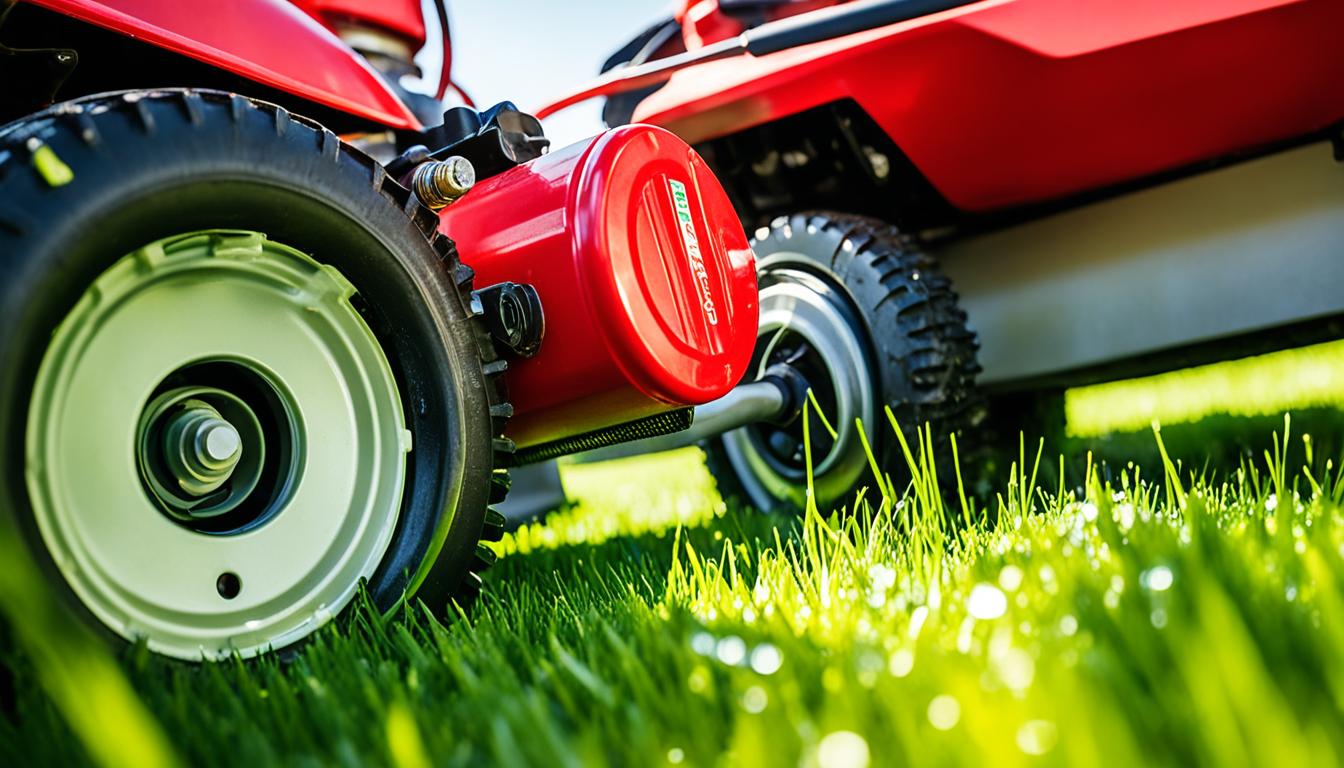Have you ever found yourself frustrated as your lawn mower repeatedly shuts off, leaving your yard in a half-mowed state? It’s a common problem that many homeowners face, but what exactly is causing your trusty lawnmower to keep dying? Is there a simple fix to get it back up and running smoothly again?
In this article, we will delve into the common issues that can cause a lawn mower to stall or stop working altogether. From a clogged carburettor to old or bad gasoline, we will explore the potential culprits and provide expert tips on how to troubleshoot and fix these problems. Get ready to unearth the secrets to keeping your lawn mower running like a champ!
Key Takeaways:
- A clogged carburettor can cause your lawn mower to stall or start and then die. Cleaning or replacing the carburettor may be necessary.
- A blocked fuel cap vent can create a vapor lock and lead to your mower starting and then dying. Consider replacing the fuel cap.
- Using old or bad gasoline can cause clogs and issues with your lawn mower’s performance. Emptying the fuel tank and using the recommended fuel can help prevent this.
- Worn or damaged spark plugs can contribute to a lawn mower that stalls or keeps dying. Inspecting and cleaning or replacing the spark plugs can help resolve this issue.
- If DIY repairs become overwhelming, hiring a lawn care company can provide expert assistance in maintaining and fixing your lawn mower.
Clogged Carburettor
A clogged carburettor can be the culprit behind a lawnmower that stalls or starts and then dies. Over time, fuel residue can build up and obstruct the carburettor, preventing it from delivering the proper fuel-air mixture to the engine.
To address this issue, cleaning the carburettor with a specific cleaning fluid or replacing it may be necessary. Regular maintenance, such as using a gas stabilizer and emptying the fuel tank before storage, can help prevent future carburettor clogs.
“A clogged carburettor can prevent the lawnmower from starting and cause it to stall or die after starting.”
If you’re unsure about cleaning or replacing the carburettor yourself, consider seeking professional assistance from a lawnmower repair service. They have the expertise to handle carburettor maintenance effectively and efficiently.
Clogged Fuel Cap Vent
A blockage in the fuel cap vent can be another reason why your lawn mower starts but then quickly dies. The fuel cap vent plays a crucial role in allowing air to enter the fuel tank to maintain the proper fuel flow as the engine consumes the fuel.
If the fuel cap vent becomes clogged, it can create a vapor lock, hindering the fuel from flowing to the carburettor. This restriction in fuel supply can cause the engine to starve for fuel and stall.
To determine if a clogged fuel cap vent is the issue, try loosening the fuel cap slightly to release any pressure buildup. If your lawn mower runs smoothly after loosening the cap, then a clogged fuel cap vent is likely the culprit.
To solve this problem, consider replacing the fuel cap with a new one that allows for proper ventilation. This simple fix can prevent vapor lock and ensure that fuel flows smoothly to the engine, allowing your lawn mower to start and run without any issues.
Key Takeaways:
- A clogged fuel cap vent can cause a lawn mower to start and then die.
- The fuel cap vent allows air to enter the fuel tank, maintaining the fuel flow.
- If the vent is clogged, it can create a vapor lock, restricting the fuel supply.
- Loosening the fuel cap can help identify if a clogged fuel cap vent is the issue.
- Replacing the fuel cap with a new one can resolve the problem and prevent future stalling.
Old or Bad Gasoline
Using old or bad gasoline can be detrimental to the performance of your lawn mower. When gasoline sits unused for an extended period, it can undergo chemical changes and deteriorate, leading to potential issues with your mower.
One common problem associated with old or bad gasoline is the formation of a sticky residue in the carburettor. This residue can clog the small jets and passages, obstructing the proper flow of fuel to the engine. As a result, your lawn mower may struggle to start, run erratically, or even die unexpectedly.
To avoid encountering these problems, it is recommended to use fresh fuel that meets the specifications outlined by your mower manufacturer. Additionally, if you plan on storing your lawn mower for an extended period, it is essential to drain the fuel tank to prevent the old gasoline from causing any issues.
If you frequently face challenges with maintaining the freshness of your gasoline, consider using a fuel stabilizer. These additives help to preserve the quality of the fuel, minimizing the chances of encountering issues associated with old or bad gasoline.
By taking these precautions and using fresh, high-quality gasoline, you can maintain optimal performance and prevent your lawn mower from experiencing problems caused by old or bad gasoline.
Worn or Damaged Spark Plugs
When it comes to a lawn mower that stalls or keeps dying, worn or damaged spark plugs can often be the culprits. Spark plugs play a crucial role in igniting the fuel-air mixture within the engine’s cylinder, providing the spark needed for combustion. However, if the spark plugs are dirty or defective, they may fail to generate a sufficient spark, leading to performance issues.
Inspecting and maintaining the spark plugs is crucial in ensuring the smooth operation of your lawn mower. Here are some steps you can take to address this problem:
- Inspect the spark plugs for damage: Carefully remove each spark plug, examining them for signs of wear or damage. Look for cracked insulators, worn electrodes, or excessive carbon buildup.
- Clean the spark plugs: If the spark plugs appear dirty but are in good condition, you can clean them with a wire brush or a specialized spark plug cleaner. Gently remove any debris or carbon buildup, ensuring they are free from obstructions that may hinder spark generation.
- Replace worn or damaged spark plugs: If the spark plugs show significant damage or wear, it is recommended to replace them. Consult your lawn mower’s manual or refer to the manufacturer’s guidelines for the correct spark plug type and specifications.
- Use a spark plug tester: To determine if a spark plug is defective, consider using a spark plug tester. This device provides a visual indication of whether the spark plug is generating a spark. If a spark plug fails the test, it should be replaced.
By keeping your spark plugs clean, well-maintained, and in good condition, you can improve the ignition process in your lawn mower’s engine. This, in turn, helps to prevent stalling and ensures that your mower continues to run smoothly.
| Common Signs of Worn or Damaged Spark Plugs | Actions to Take |
|---|---|
| Difficulty starting the lawn mower | Inspect and clean the spark plugs |
| Lack of power or slow acceleration | Replace the spark plugs if necessary |
| Inconsistent engine performance | Use a spark plug tester to identify defective plugs |
| Frequent stalling or engine misfires | Ensure spark plugs are clean and functional |
Calling in the Experts
Lawn mower maintenance can be challenging, and if you prefer not to tackle it yourself, hiring a lawn care company can provide expert assistance. These professionals have the knowledge and experience to handle various maintenance tasks, ensuring that your lawn mower stays in optimal condition.
One of the key areas where a lawn care company can assist you is in carburettor cleaning. Over time, the carburettor can become clogged with dirt, debris, and residue, affecting the performance of your lawn mower. A skilled technician can thoroughly clean the carburettor, ensuring that it functions efficiently and delivers the right fuel-air mixture to the engine.
In addition, a lawn care company can help with the application of fuel stabilizer. This additive is essential for maintaining the quality of the gasoline in your lawn mower’s fuel tank. By using a fuel stabilizer, you can prevent the formation of varnish and gum, which can clog the carburettor and lead to performance issues.
Spark plug replacement is another area where expert assistance can be beneficial. Spark plugs play a crucial role in igniting the fuel-air mixture in the engine’s cylinder. A lawn care company can inspect the spark plugs, clean them if necessary, and replace them if they are worn or damaged. This ensures a reliable spark for ignition and promotes smooth engine operation.
By handing over the responsibility of lawn mower maintenance to a professional, you can save time and have peace of mind knowing that your equipment is in capable hands. Whether it’s carburettor cleaning, fuel stabilizer application, spark plug replacement, or other maintenance tasks, a lawn care company can provide the expert assistance needed to keep your lawn mower running smoothly.
| Benefits of Hiring a Lawn Care Company for Maintenance |
|---|
| Expert knowledge and experience |
| Thorough carburettor cleaning |
| Application of fuel stabilizer |
| Spark plug inspection and replacement |
| Time-saving |
| Peace of mind |
Dirty Carburettor and Float Bowl
A dirty carburettor and clogged float bowl can be the cause behind your lawn mower suddenly stopping. The carburettor plays a crucial role in mixing air and fuel to create the combustion necessary for the engine to run smoothly. However, when the float bowl or the ports in the carburettor become clogged with residue or debris, it can disrupt this essential process.
To address this issue, it is important to clean the carburettor thoroughly using a suitable carburettor cleaner. By removing any buildup inside the carburettor, you can ensure a steady supply of fuel to the engine, preventing interruptions in combustion. Cleaning the carburettor will also help eliminate common symptoms such as black smoke or unusual noises like sneezing and popping.
To better understand the impact of a clogged float bowl, imagine trying to drink a beverage with a blocked straw. Just as you would struggle to get the drink to flow smoothly, a clogged float bowl restricts the fuel flow, creating problems in the combustion process and causing the lawn mower to come to a halt.
Regular maintenance to keep the carburettor and float bowl clean is crucial for the overall performance of your lawn mower. By taking the time to clean the carburettor and ensuring the float bowl is free from debris, you can prevent unexpected interruptions and keep your lawn mower running smoothly.
Fuel System Cleaning Products Comparison
| Product | Features | Price |
|---|---|---|
| Brand A Carburettor Cleaner | – Cleans carburettor thoroughly – Removes residue and debris – Improves fuel flow to the engine |
$9.99 |
| Brand B Carburettor Cleaner | – Powerful cleaning action – Removes tough buildup – Restores carburettor performance |
$12.99 |
| Brand C Carburettor Cleaner | – Fast-acting formula – Safe for all carburettor components – Improves engine starting and idle |
$14.99 |
Choosing the right carburettor cleaner is essential for effective cleaning. Brand A Carburettor Cleaner offers a budget-friendly option, while Brand B’s product is designed to tackle tough buildup. Brand C Carburettor Cleaner provides a fast-acting solution that improves engine performance with safe usage on all carburettor components. Consider your specific needs and budget when selecting a fuel system cleaner for your lawn mower.
Old Gasoline and Sour Smell
When a lawn mower sits unused for months, old gasoline can evaporate and leave behind a sticky residue that affects its performance. This old gasoline may have a sour smell and can cause issues such as rough idling, stalling, or a pinging sound. To resolve this problem and ensure your lawn mower starts and runs smoothly, follow these steps:
- Drain the old fuel: Begin by draining the old gasoline from the fuel tank. This can be done by carefully removing the fuel tank cap and pouring the contents into a suitable container.
- Clean the carburettor ports: Using a carburettor cleaner, clean any residue or debris that may have accumulated in the carburettor ports. This will help improve the fuel flow and prevent clogs.
- Add fresh fuel: Once the old fuel has been drained and the carburettor ports are clean, add fresh gasoline to the fuel tank. Be sure to use a fuel recommended by your mower manufacturer.
In cold climates, it’s important to note that condensation can occur inside the fuel tank, making this maintenance step even more crucial. By following these steps, you can ensure that your lawn mower is fueled with clean gasoline and won’t experience any starting issues or unpleasant odors.
| Benefits of Addressing Old Gasoline and Sour Smell |
|---|
| Improved performance: By removing old gasoline and cleaning the carburettor ports, your lawn mower will start and run more smoothly, without any stalling or rough idling. |
| Prevention of further damage: Old gasoline can cause clogs and damage to the carburettor, leading to more extensive repairs. Addressing this issue promptly can prevent costly repairs in the future. |
| Elimination of unpleasant odor: The sour smell associated with old gasoline can be unpleasant and may linger around your lawn mower. By adding fresh fuel, you’ll get rid of the sour smell and make your mowing experience more enjoyable. |
By following these simple steps, you can ensure that your lawn mower is free from old gasoline and the associated sour smell. This maintenance task will not only improve the performance of your mower but also prevent further damage and eliminate unpleasant odors. Don’t let old fuel hinder your lawn care routine – take action and enjoy hassle-free mowing!
Dirty or Defective Spark Plugs
Dirty or defective spark plugs can be a common culprit when your lawn mower refuses to start properly. Over time, carbon deposits and buildup accumulate on the spark plugs, hindering their ability to ignite the fuel-air mixture in the engine. This can result in a weak-sounding mower that turns over but doesn’t start.
Thankfully, there are steps you can take to address this issue. Start by carefully removing the spark plugs and inspecting them for any signs of dirt, grime, or damage. If the plugs are dirty but not significantly worn or damaged, cleaning them can often restore their functionality. Use a wire brush and a spark plug cleaner to gently remove the buildup, ensuring that the spark plug’s electrode and gap are clean.
On the other hand, if the spark plugs are significantly worn, damaged, or beyond cleaning, it’s essential to replace them. Look for spark plugs that are compatible with your specific lawn mower model and engine type. Ensure proper installation by hand-tightening the plugs and avoiding over-tightening, which can cause thread damage.
To determine if a spark plug is defective, use a spark plug tester. This handy tool measures the spark between the terminals when the plug is connected to the ignition system. If the tester indicates a lack of spark, it’s a clear indication that the spark plug is defective and needs replacement.
By addressing dirty or defective spark plugs, you can restore your lawn mower’s ability to start reliably. Remember to clean or replace the spark plugs regularly as part of your lawn mower maintenance routine to prevent future starting issues.
Excess Oil in the Reservoir
Having too much oil in the reservoir of your lawn mower can lead to various issues that can affect its performance. Excess oil can cause an overheating engine, emit white smoke, and result in slow starts. It’s important to address this problem to ensure your lawn mower functions properly.
To resolve the issue of excess oil, you can follow these steps:
- Unscrew the oil tube.
- Tilt the mower on its side, positioning it above a container.
- Allow the excess oil to drain into the container.
Additionally, it is recommended to change the oil filter to ensure the proper functioning of your lawn mower. Regular maintenance and oil checks are essential to prevent the accumulation of excess oil and avoid related issues.
Regular maintenance and checking the oil levels can help prevent excess oil in the reservoir, ensuring optimal performance of your lawn mower.
Conclusion
Keeping your lawn mower in optimal condition is crucial for maintaining a beautiful yard. When troubleshooting a lawn mower that keeps dying, it’s important to consider common issues such as a clogged carburettor, dirty spark plugs, old or bad gasoline, and excess oil. Regular maintenance is key to preventing these problems and ensuring a hassle-free mowing experience.
By regularly cleaning the carburettor, using a fuel stabilizer, inspecting and cleaning the spark plugs, and checking the oil level, you can avoid many of the issues that can cause your lawn mower to malfunction. These simple maintenance tasks can go a long way in keeping your lawn mower running smoothly.
However, if you’re overwhelmed by DIY repairs or encounter more complex issues, it’s wise to seek professional repair services. Professional lawn mower repair experts have the knowledge and expertise to troubleshoot and fix any problems that may arise. They can ensure that your lawn mower is properly repaired and maintained, allowing you to enjoy a well-groomed yard without the frustration of constant breakdowns.
Remember, proper lawn mower troubleshooting and maintenance are essential for keeping your equipment in top shape. By addressing common issues and implementing regular maintenance practices, you can extend the life of your lawn mower and enjoy a hassle-free mowing experience for years to come.





